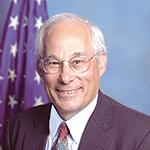By LISA EISENHAUER
Dr. Donald M. Berwick acknowledged that the call he put out to those attending CHA's Sponsorship Institute to pursue "the moral determinants of health" was a big ask.

Berwick
He has mounted a campaign to urge the nation to refocus its efforts to improve health away from clinical care and toward addressing underlying causes of poor health such as underperforming schools, low-paying jobs, inadequate housing and the social isolation of older citizens.
He laid out his proposal in "The Moral Determinants of Health," an opinion piece that appeared in the JAMA Network on
June 12. "No scientific doubt exists that, mostly, circumstances outside health care nurture or impair health," he wrote.
Berwick expanded upon his thoughts when he spoke at the Sponsorship Institute on Jan. 19. The event, which continued on Jan. 21, drew about 100 people from Catholic health ministries. Its topic was "Charting a Path Forward for the Post-COVID-19 World and Church Relations."
Berwick is a clinical pediatrician who has a long list of accomplishments. They include running the Centers for Medicare and Medicaid Services under President Barack Obama and being president emeritus and a senior fellow at the Institute for Healthcare Improvement, a nonprofit focused on motivating and building the will for change. He also was a co-author of two seminal reports on how to improve health care: To Err is Human: Building a Safer Health System and Crossing the Quality Chasm: A New Health System for the 21st Century. The reports were products of the Institute of Medicine's Committee on Quality of Health Care in America. The institute is now the National Academy of Medicine.
He noted in his talk that the nation's social ills have been brought to the fore in recent months by the COVID-19 pandemic's harsher toll on communities of color and the systemic racism spotlighted by the police killing of George Floyd.
However, he said the United States long has known that such inequities exist. He pointed out that studies have shown for decades that health conditions and shorter life spans correlate with poverty, hunger, crime and other societal menaces.
"It's no news at all and yet here is a country which is spending 18% of our gross domestic product on health care that is, I would guess, in policy terms, turning its back on cause," Berwick said.
Committing to equity
Berwick made several references to The Health Gap: The Challenge of an Unequal World, a book by British epidemiologist Michael Marmot. He described it as the most efficient and disciplined summary of the state of knowledge about the global causes of illness and health that he has ever read.
The book points to five determinants of health — early childhood experiences, education, work and the workplace, experiences of elders and community resilience. Those five factors are the keys to a sixth determinant of health, which Marmot calls fairness and Berwick calls solidarity, as in a sense that people in a society care about and for each other.
"Marmot's read back is when communities and societies have a sense of commitment to equity they invest in the conditions of daily life, those five social determinant arenas, which make them healthier societies," Berwick said. "Societies that tolerate high degrees of inequity, by the same cascade, experience higher inequities in health."
How those inequities play out in the United States is obvious, in Berwick's view. He pointed to cities such as New York and Chicago where life expectancies can be predicted based on neighborhood, with residents of those with the highest average household incomes far outliving the residents of poor neighborhoods. He noted that those low-income neighborhoods tend to have high concentrations of Black and Hispanic residents.
Time is right
With the nation's attention focused on social ills because of the pandemic and the renewed cries for social justice, he said, now is the time to address them.
His campaign offers seven broad solutions that he said will take political might to bring about:
- Ratifying major United Nations human rights treaties that the U.S. is nearly alone among democracies in snubbing.
- Making health care a human right.
- Reversing climate change.
- Reforming the criminal justice system.
- Reforming the immigration system.
- Ending hunger and homelessness.
- Restoring dignity to democratic institutions and integrity to the voting process.
"This is a weird list to be showing a group of health care leaders, but that is in some ways my point," Berwick said. "I think health care needs to embrace morality in the pursuit of health and, therefore, this agenda in the pursuit of health. I think this is our work."
'A very big ask'
To do that work will require more than shifting the focus of the nation's health policies, Berwick pointed out. It will require shifting resources, including some of the $3.5 trillion that now goes to the health care system.
"That is a very big ask. It means becoming party to, I guess, a transformation," he said. "It means a new way to think about our work, new investments, new business models and the willingness to give up our hints of avarice — our political ability to confiscate resources — and to give it back to society for other uses."
In addition to advocating for broader change, Berwick said health systems and leaders can take direct action on their own. They can devise ways to reduce the per capita cost of care, change practices to reduce their own carbon footprints, set up programs to hire the recently incarcerated and boost the communities around their facilities by including local industries in supply chains.
Berwick ended by acknowledging that his solutions for improving the nation's health aren't simple or perhaps even palatable for some health care leaders. "I apologize if I've offended anyone with this talk because I'm asking for more change than most have considered," he said. "But I don't see another route to well-being."